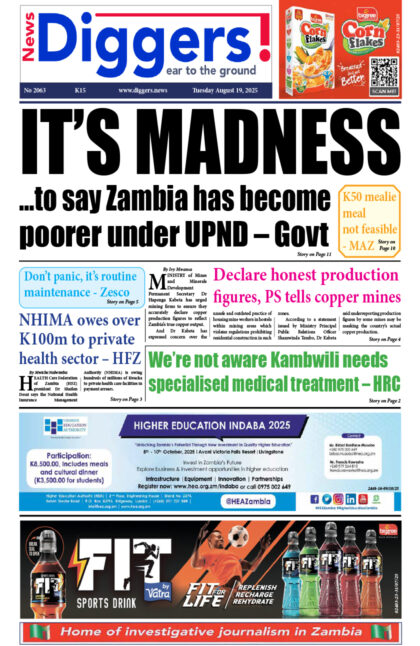SPEAKER of the National Assembly Dr Patrick Matibini says UPND members of parliament, who walked out of the House when Constitution Amendment Bill Number 10 of 2019 was being considered three weeks ago, were not out of order.
Dr Matibini has, however, said, even though walkouts in themselves do not amount to a breach of parliamentary practice and procedures, they deny the electorate of their full representation in the House.
Speaking when he rendered a ruling on the point of order raised by Lupososhi PF member of parliament Chungu Bwalya on whether or not UPND members of parliament were in order to have walked out of the House when a matter as important as Bill 10 was being considered, Dr Matibini said a walkout was a means through which MPs expressed their displeasure.
“Honourable members will recall that on 24th June 2020, when was House was considering the report of the committee on media, information communication technologies and the honourable member of parliament for Chama Mr D. Mung’ambu MP was debating, Mr L.C Bwalya MP, Northern Province Minister raised on a point of order in the following terms and I quote: ‘Mr Speaker, I recognize the fact that we have an opportunity as members of parliament to converse outside and to be able to walk out of Parliament. Mr Speaker my point of order is about the UPND members of parliament; at least where I am here in the theater Mr Speaker, all of them stood up and walked out. That left me wondering what is it is going on whether or not these honourable members of parliament are here to represent their electorate out there and perform their functions as legislators and promote the governance that we the Zambians have enshrined in our Constitution’,” Dr Matibini recounted.
“…’Mr Speaker, are the honourable members of parliament from the UPND in order to walk out of the chamber, the theater and indeed I want to presume other areas where they are sitting just immediately we begin deliberating after a long kind of a holiday due to COVID-19? Are they in order Mr Speaker to deny their electorate a chance to hear them and also to not allow themselves to participate in the affairs of this country? I need your serious ruling Mr Speaker.’ In my immediate reaction to the point of order, I reserved my ruling to enable me investigate the matter and render an informed ruling. I have since studied the matter and I am now ready to render my ruling.”
Dr Matibini said the UPND members of parliament were in order to have walked out of parliament because a walkout is a conventional means through which a member or members can express their displeasure on a matter before the House.
“A walkout is a conventional means through which a member or members can express his or her or their displeasure on a matter before the House. I also wish to point out that although the practice of walkouts is common in most Parliaments worldwide; it has, however, adverse effects namely; it deprives the electorate of representation during the subsistence of the walkout. In this regard, in a ruling I rendered on Tuesday, 24th November, 2015, on a point of order that was raised by the [then] honourable Minister of Local Government and Housing, honourable S. Kampyongo MP against UPND members of parliament on Thursday 19th October, 2015 found in the National Assembly Parliamentary debates of 18th September to 10th December, 2015 at pages 1868 to 1871, I started inter alia as follows and I quote: ‘let me hasten to point to out that while it is conventional for members to walk out of the chamber for political or other reasons, this practice nevertheless has unfortunate tendency of denying the electorate their representation in the House’, end of quote. Therefore honourable members, I wish to reiterate that walkouts in themselves do not amount to a breach of the rules of the House or indeed parliamentary practice and procedure albeit they deny the electorate of their representation in the House. In view of the forgoing, the honourable members of the UPND who walked of the House were not out of order, I thank you,” ruled Dr Matibini.
























